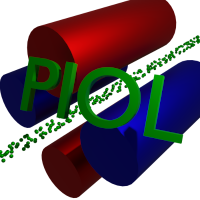piol.transfermatrix module¶
Inheritance diagram¶

API reference¶
- class piol.transfermatrix.TransferMatrix[source]¶
Bases:
objectClass representing any order transfer matrix (Taylor polynomial).
TransferMatrix is a class which implements a mathematic tool to apply taylor polynomials to multiple coordinates. It is a mathematical tool and doesn’t necessary transfer particles forward on the optical axis.
- outCoords¶
String of output coordinates
- Type
str
- inCoords¶
String of input coordinates
- Type
str
- addCoefficient(outputcoord, value, inputcoords)[source]¶
Adds a coefficient to the matrix.
Adds coefficient to the matrix and updates the string of output coordinates (member outCoords) and string of input coordinates (member inCoords).
- Parameters
outputcoord (str) – Single character
value (float) – Value of the coefficient
inputcoords (str) – String of single character base coordinates
Notes
After adding a last coefficient one should call sortMergeCoefficient() to improve the performance.
- apply(coords)[source]¶
Modifies the coordinates according to the stored taylor polynomials.
- Parameters
coords (dictionary of numpy arrays) – Dictionary where each key is a string of length 1 and is the name of the coordinate and value is a numpy array of values of this coordinate for the ensamble.
Notes
All numpy arrays (values of the dictionary ‘coords’) must have same length.
- getCoefficient(outputcoord, inputcoords)[source]¶
Returns a value of a coefficient.
Finds the coefficient and returns its value. If coefficient is not found then Exception is raised. Inputcoords is sorted (see sortMergeCoefficients()) so passing “xax” there will match base “axx”.
- Parameters
outputcoord (str) – Single character
inputcoords (str) – String of single character base coordinates
- multiply(other, order=None)[source]¶
Multiplies two transfer matrices.
Multiplies the current transfer matrix B with a given matrix A as C=B*A. NOTE: the TransferMatrix C multiplies coordinates from left. Consequence: in the optical axis B comes later than A!
The resulting transfer matrix C=B*A can be always formed. The transformation of C applied to a set of coordinates will be equal to use of subsequent transformations A and B apart from rounding errors. This means that B can contain an input coordinate which is not any of A’s output coordinate.
- Parameters
other (TransferMatrix) – Transfer matrix to be multiplied with self. (A)
order (int, optional) – Maximum order for coefficients to return. If not given, then maximum resulting oreder is the sum of orders of self and other.
- Returns
Multiplied TransferMatrix up to order `order`
- Return type
TransferMatrix.
